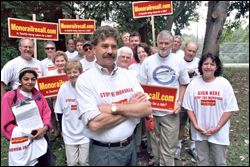Will there be a fourth citywide vote on the new monorail? No, if you do the math. Yes, if Tim Wulf does it. “We need 17,500 signatures from our volunteers,” says the head of Monorail Recall, a group seeking a revote to kill Seattle’s planned $1.6 billion, 13.7-mile elevated system. “We currently have 11,500. Not bad at all!”
The Seattle Monorail Project (SMP), which this week got City Council approval to begin building in the fall, still faces a shaky bid opening in August and must pass a planned independent financial review ordered by City Hall. So if the monorail’s derailed, it likely won’t be by a new vote. With a mix of volunteer and paid signature gatherers, the recall campaign inched toward 12,000 names over the weekend. Since early May, it has averaged 1,500 signatures a week. But the petition drive needed the names of more than 5,000 additional registered Seattle voters with just over a week remaining before a July 15 deadline.
Additionally, recallers once again face the prospect of all their effort being wiped out. SMP last week quietly appealed a recent King County court ruling that required Monorail Recall to change the wording of its initiative but rejected SMP’s request to toss out those names already collected. “We filed notice for reconsideration,” says Ross MacFarlane, SMP’s legal director, “or, in the alternative, to allow an appeal.” The agency thinks the court was in error to let the signatures stand under a ballot title that it found faulty. The secretary of state’s office voiced support for the SMP challenge, saying it was the first time in 30 years in which signatures on petitions with an invalidated title would weigh equally with those on a separate, validated title, says MacFarlane. SMP also has filed a second lawsuit challenging the legal foundation of the initiative.
Well, well, says a miffed Wulf. “Why is the SMP so afraid of another vote,” he asks, “if the monorail is still as popular as they say it is?”
Initiative 83 is an end run around the monorail project’s building plans. A favorable November vote would direct the city to refuse use of streets and sidewalks for monorail construction, leaving the project with a unique engineering challenge: an elevated system that is either built on private property or sprouts wings.
Following two earlier votes approving monorail planning, voters in 2002 gave the go-ahead to construct the first leg, the Green Line, from Crown Hill north of Ballard, through downtown, to West Seattle, paid for by a motor vehicle excise tax. The winning margin was 877 votes. With the monorail now embroiled in funding and design controversies—particularly sky- blotting columns and rails through Seattle Center and downtown—a revote is not on SMP’s wish list.
The agency is also in the midst of a backlash from vehicle owners suffering from license-renewal sticker shock. The tax rose last month to 1.4 percent (from 0.85 percent) of a vehicle’s estimated value. With cars and trucks assessed by the state sometimes at twice their actual market value, some drivers are paying the equivalent of a 2.8 percent tax, they say.
In one example, Seattle car owner Alyssa Poling says she paid $15,000 for a vehicle that had been wrecked and repaired. Though she was unable to sell it even for $12,000, the state values it at $29,000. “Here is a car with virtually no resale value that will cost me over $400 [in monorail taxes] to register this year! The inability to contest their assessment screams violation of due process to me,” Poling says.
It’s the state, not the monorail, that sets valuations based on book value. “The largest hurdle to using a market value would be that the condition of a vehicle is a huge factor in determining value, so it would have to be taken into account for the calculation,” says Department of Licensing spokesperson Ben Benfield. “This would require some type of appraisal to do accurately, and the state simply doesn’t have the resources to look at more than 6 million registered vehicles every year.” But the new SMP tax is aggravating the usual outrage. Seattle car owner Robert Alan says his $13,000 vehicle is being assessed at $30,000, costing him more than $1,000 for license renewal—$420 of it for the monorail. A monorail official told him, Alan says, “that the tax rate was set at what it was to prevent individuals like me from having too many cars, to prevent congestion and pollution.” The monorail, in fact, cannot achieve its financial projections, already off by a third, without Seattle residents continuing to own and buy cars, preferably newer, expensive rides like SUVs and Hummers (see “Tanking Revenues,” April 28, 2004).
Tim Wulf hopes sentiments like Alan’s will put his drive over the top. “We intend to secure all 17,500 signatures from volunteers,” says Wulf, but “we need the help from paid signature gatherers for a safety cushion.” Some signatures have been deemed invalid due to poor penmanship or addressing, he says, while others have been stolen.
“One volunteer had a clipboard with many pages of petitions on it,” says Wulf. “Someone came up pretending to want to sign. He grabbed the entire clipboard full of filled out petitions and ran down the street. Amazing.”
Other signature gatherers have been harassed by “opponents,” Wulf claims—something signature gathers for other initiatives, like Tim Eyman’s antitax measures, have also complained of. One anti-anti- monorailer has set up a Web site whose address, MonorailRecall.org, mirrors Wulf’s MonorailRecall.com. It features “Monorail Facts,” which consist of favorable monorail news articles. (The Queen Anne man to whom the domain is registered could not be reached for comment.)
“We still think we can do it,” says Wulf of his petition drive. “If life did not have challenges, we would not appreciate our victories.”








